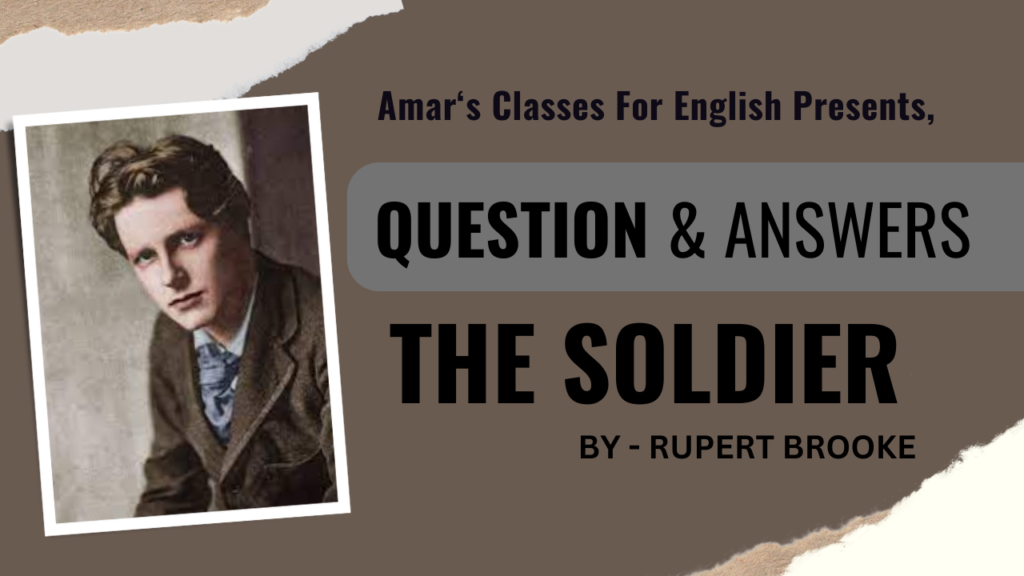
ABOUT POET
“The Soldier” is written by Rupert Brooke. He was born in 3 August, 1887 in Warwickshire, England. He died on 23 April, 1915 in Skyrose, Greece. Rupert Brooke was an English Poet. His father was a housemaster at Rugby School. W.B. Yeats describe him as “The handsomest young man in England”. He is also known as War Poet. He died of Septicaemia (blood poisoning).He wrote many books like Letters from America, The Penguin Book of First World War etc.

SUMMARY
“The Soldier” is written by the poet Rupert Brooke. The thoughts of a soldier towards his motherland with his immense desire to sacrifice his life is also reflected in the poem. The poet admires England and expresses his gratitude to it. The poet is describing about some foreign land, which is the part of England and on which he will be buried after his death. He wants a peaceful country and there would be no war between the two countries. According to him the surroundings of England is just like heaven as he says, “Under an English heaven”.

WORD POWER
- If I should die-अगर मई मर जाऊ
- Think only of me -मेरे बारे में इतना सोचना
- Foreign -विदेश
- Forever -हमेशा
- Dust -धूल
- Bore -जन्म दिया
- Shaped -आकार दिया
- Made aware -जागृत किया
- Once -एक बार
- Roam – भटकना
- Ways -रास्ते
- Shed away -बहा ले गया
- Heart – दिल
- All evil- सभी बुराई
- Washed by river-नदी के द्वारा धोया गया
- Somewhere- कही भी
- Thoughts – सोच
- Sights –
- Gentleness- भद्रता
- Dream – सपना
- Laughter – हसी
- Concealed- छुपा हुआ
- Corner- किनारा
- Blest- आशीर्वाद दिया

VVI MCQs
1 . The Soldier‛ is a poem in_____
- lyric
- sonnet
- balled
- none of these
2. The Soldier‛ is ________
- a sonnet
- an epic
- an ode
- poetry
3. Rupert Brooke has composed this poem.
- Snake
- Fire-hymn
- Song of myself
- The Soldier
4. The solider‛ is a ______
- Sonnet
- Simile
- Metaphor
- Octagon
5. Rupert Brooke is a _______ poet.
- War
- Romantic
- Metaphysical
- Modern
6. Rupert Brooke was born in _____
- 1928
- 1885
- 1887
- 1910
7. Rupert Brooke died in _______
- 1918
- 1915
- 1918
- 1920
8. W.B. Yeats described him as ‚the handsomest ______ in England.
- Man
- Father
- Mother
- People
9. Rupert Brooke inspired patriotism in early phase of ______
- World War-I
- Civil War
- Cold War
- World War-II
10. The reason of death of Rupert Brooke was _____
- Sapticaemia
- Tuberculosis
- Cancer
- Blood Cancer
11. If I should ____think only of me.
- Kill
- Die
- Love
- Hate
12. Rupert Brooke studied in ________school.
- Clark’s School
- Rugby School
- The Doon School
- Amar’s Classes for English
13. Rupert Brooke was educated in ______college
- King’s
- St. Joseph
- St. Mary
- Amar’s Classes for English
14. Rupert Brooke studied at the university of__
- Cambridge
- Oxford
- J.N.U
- B.H.U
15. Rupert Brooke’s father was a ___at Rugby school.
- Post master
- School master
- Headmaster
- Housemaster
16. A body of England breathes ____ air.
- American
- English
- British
- Indian
17. ____ inspired patriotism in the early phase of the 1st World War.
- John Donne
- John Keats
- Rupert Brooke
- T.S. Eliot
18. Rupert Brooke was a ____soldier.
- Greek
- American
- English
- African
19. The first 8 lines of a sonnet is called ________
- Octave
- Sestate
- Petagon
- Square
20. The last 6 line of a sonnet is called ________
- Sestet
- Pentagon
- Sexagon
- Octagon
21. The solider is a ____poem in the form of sonnet
- Patriotic
- Comedy
- Humorous
- Romantic
22. _____ described Rupert Brooke as “The handsomest man”
- Walter De La Mare
- Wordsworth
- William Shakespeare
- W.B. Yeats
23. Who died of sepsis
- John Keats
- Rupert Brooke
- John Donne
- John Ibrahim
24. Rupert Brooke died in ______ sea
- Black
- Aegean
- Arabian
- China
25. The line “A pulse in eternal mind, no less” is written by __
- Rupert Brooke
- W. H. Auden
- Walt Whitman
- John Donne
26. “If I should die, think only this of me” line from __
- Song of Myself
- To Autumn
- The Soldier
- An Epitaph
27. Rupert Broke is remembered as ____
- Trench Poet
- War Poet
- Romantic Poet
- Metaphysical Poet
28. According to ‘The soldier’ England has given her natives. her flower ___
- to worship
- to love
- to offer
- none of these
29. “The dust” stands for ___
- leader
- teacher
- farmer
- Soldier
30. The poet expresses his indebtedness to__
- India
- America
- England
- London

VVI QUESTION & ANSWERS
1. Is the speaker afraid of Death?
Ans- No, the speaker is not afraid of death. he would be given a corner of the foreign field.
2. If at all he dies in the battle, how would he like to be remembered?
Ans- If at all he dies in the battle, he would like to be remembered as an unforgettable soldier who never feared death. He would be given flowers of love and buried in some corner of land which is part of England.
3. How can ‘some corner of a foreign field’ be ‘for ever England?
Poet’s grave will be in some corner of a foreign land. In that way, it will be “forever England”
4. ‘In that rich earth a richer dust concealed. ‘What does ‘dust’ stand for?
In this sentence of the poem ‘In that rich earth a richer dust concealead’ for the mortals remains of the poet, after his death in the war- field. Dust also stands for those persons who avoid war and wanted to live a peaceful life. They never quarreled for anything.
5. What is meant by the phrase’ A pulse in the eternal mind”?
The phrase ‘ A pulse in the eternal mind” indicates a long- cherished desire. The poet wants to say that there must be a pulse in the eternal mind that works to avoid war.
